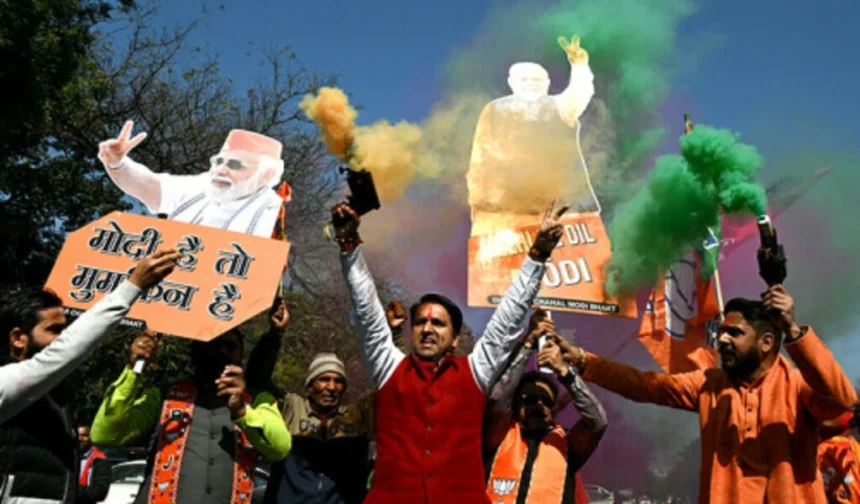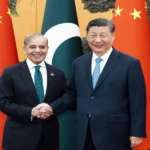For the first time in 27 years, Prime Minister Narendra Modi’s party will establish a government in the Indian capital of Delhi after securing an impressive election victory.
According to the Election Commission of India (EC), the Bharatiya Janata Party (BJP) has either won or is in the lead in 48 seats of the 70-member legislative assembly, while the incumbent Aam Aadmi Party (AAP) is ahead in 22 seats.
The government may be formed by a party that secures over 35 seats (the midway mark).
On X, Modi wrote, “Good governance triumphs, development wins,” and pledged that his party would spare no effort to develop Delhi.
Arvind Kejriwal, the former Delhi chief minister of the AAP, congratulated the BJP on its victory and stated in a video message on X that he and his party “humbly accepted” the people’s verdict.
“I hope they live up to the expectations of the people who voted for them,” according to him.
Delhi Election Results: BJP’s First Majority in Nearly 30 Years
Given Delhi’s symbolic significance as the nation’s capital, the election was a contest for prestige between the BJP and AAP.
Since 2013, the AAP has governed the city, a federally administered territory. Voters support the party’s strong welfare record. However, the party and its leaders have encountered numerous obstacles in recent months, including allegations of corruption that they have denied.
After being out of power in the nation’s capital since 1998, the BJP’s acquisition of Delhi signifies more than just electoral success; it establishes a critical foothold.
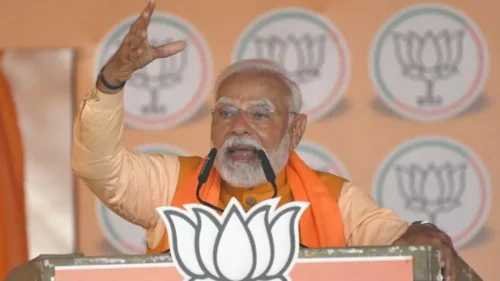
The Delhi campaign was the focus of the party’s resources, with Modi and Home Minister Amit Shah attending events.
Congress, the primary opposition party at the national level, was also involved in the election; however, it failed to secure a single seat.
The party was in power in Delhi from 1998 to 2013, but it was expelled due to allegations of corruption. This caused voters to shift their support to the AAP. Since then, the party has been unsuccessful in its endeavours.
According to experts, the victory in Delhi, which is politically significant, will serve to bolster Modi’s popularity among Indian voters following the party’s loss of its absolute majority in the general election of the previous year.
The defeat dealt a significant setback to the AAP. This much smaller party was praised in its early years in power for its emphasis on enhancing education and health facilities in the city.
Nevertheless, the beleaguered party would have won by retaining Delhi, although it also governs Punjab state, which is currently confronting questions about its future.
After more than a decade in political power in Delhi, the AAP’s appeal has diminished, particularly among the middle class, which was previously attracted to Kejriwal’s anti-corruption posture.
Kejriwal, who was previously a proponent of the middle-class-led anti-corruption movement, transitioned to becoming the party of the poor. The precise date at which the poor and Delhi’s struggling working class abandoned him is unknown.
Corruption allegations significantly diminished the AAP’s campaign. The imprisonment of key leaders and Kejriwal’s detention resulted in a void that the BJP promptly filled.
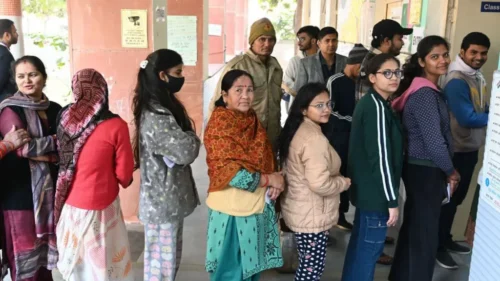
The BJP’s “double-engine” pitch, which entailed the same party ruling state and federal administrations, was bolstered by a robust electoral machine and abundant resources. This approach was intended to ensure stability and improved governance.
The BJP has achieved its first Delhi majority in nearly three decades, a historic victory. Although its “Parivartan” (change) message resonated with many, its BJP’sured the landslide victory. ultimately secured the landslide victory
This further solidifies the BJP’s resurgence following last year’s general election defeat and its recent victories in Haryana and Maharashtra. The fragmented opposition is in disarray as Delhi continues deteriorating, while the BJP is poised to dominate the upcoming electoral cycle.
The AAP’s most significant electoral losses on Saturday were the defeats of senior leaders Kejriwal and Manish Sisodia in the New Delhi and Jangpura constituencies, respectively.
From the Kalkaji constituency, the incumbent Chief Minister Atishi achieved only a narrow victory.
The number of eligible electors who cast their ballots exceeded 60%. Although such predictions have been inaccurate in the past, most exit polls had anticipated an absolute majority for the BJP.
Kejriwal, an anti-graft activist, and Sisodia were among the individuals imprisoned in the past two years in a corruption case related to a now-scrapped alcohol sales policy.
A significant portion of the BJP campaign was intended to target him. After spending months in detention, both leaders, who deny all charges, were granted bail separately last year.
Kejriwal has accused Modi’s party of conducting a “political vendetta” against him and the AAP, a charge that the BJP denies.
Delhi’s governance framework is distinctive. The lieutenant governor (LG), appointed by the federal government, makes critical decisions regarding public order, police, and land. Education, health, and public services are among the topics that the state legislature oversees.
This division frequently conflicts between the federal government and state legislatures when administered by opposing political parties.
The election campaigning in Delhi was also more focused on welfare issues than on political or identity issues, which, due to the power structure, play a larger role in elections elsewhere in the country.
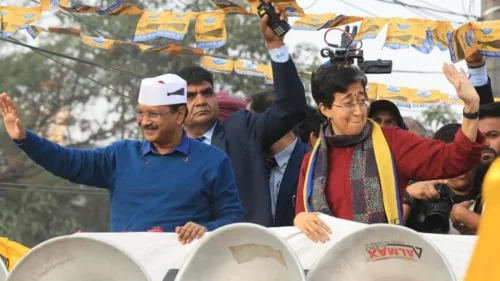
BJP’s Promises of Improved Public Services and Tax Benefits for Middle-Class Voters
The AAP and BJP campaigns pledged to enhance public institutions, provide free healthcare services, and distribute cash to women.
In the interim, the BJP anticipated a boost from last week’s federal budget, which reduced income tax for the salaried middle class, a critical electoral bloc in the capital.
However, Delhi’s perennial air pollution crisis, which impacts the city of over 30 million most of the year, was largely left off the agenda during the acrimonious weeks-long campaign.
Other parties also mentioned the crisis in their manifestos, and the BJP, if elected, pledged to reduce the city’s Air Quality Index (AQI) by half by 2030. However, the matter did not dominate the conversation or become a topic of discussion during the election campaign.

Salman Ahmad is known for his significant contributions to esteemed publications like the Times of India and the Express Tribune. Salman has carved a niche as a freelance journalist, combining thorough research with engaging reporting.




